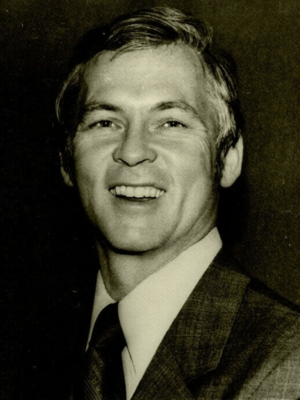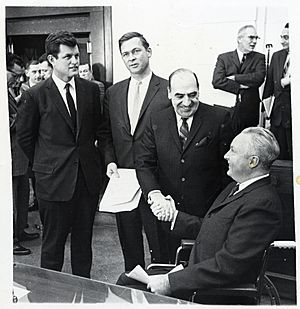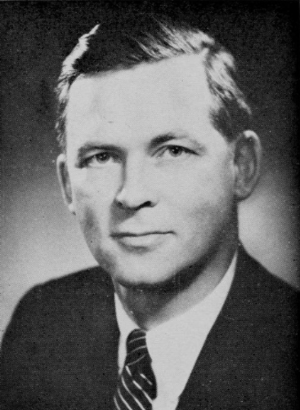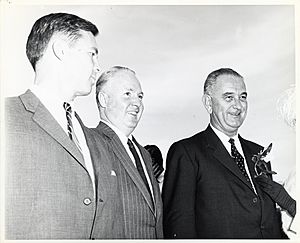Endicott Peabody facts for kids
Quick facts for kids
Endicott Peabody
|
|
|---|---|
 |
|
| 62nd Governor of Massachusetts | |
| In office January 3, 1963 – January 7, 1965 |
|
| Lieutenant | Francis Bellotti |
| Preceded by | John A. Volpe |
| Succeeded by | John A. Volpe |
| Member of the Massachusetts Governor's Council from the 3rd district |
|
| In office 1955–1957 |
|
| Preceded by | David B. Williams |
| Succeeded by | Christian A. Herter, Jr. |
| Personal details | |
| Born | February 15, 1920 Lawrence, Massachusetts, U.S. |
| Died | December 2, 1997 (aged 77) Hollis, New Hampshire, U.S |
| Political party | Democratic |
| Spouse |
Barbara Welch Gibbons
(m. 1944) |
| Children | 3 |
| Education | Harvard University (AB, JD) |
| Military service | |
| Allegiance | |
| Branch/service | United States Navy |
| Battles/wars | World War II |
| Awards | Silver Star |
Endicott Howard Peabody (February 15, 1920 – December 2, 1997) was an American politician from Massachusetts. He was a member of the Democratic Party. He served one two-year term as the 62nd Governor of Massachusetts, from 1963 to 1965.
During his time as governor, he was known for being against the death penalty. He also signed a bill that created the University of Massachusetts Boston. After his time as governor, Peabody tried several more times to win political office in Massachusetts and New Hampshire. This included campaigns for the U.S. Senate.
Contents
Endicott Peabody's Early Life and Education
Endicott Peabody, often called "Chub," was born in Lawrence, Massachusetts. His family had deep roots in American history. He was the grandson of a famous educator, also named Endicott Peabody.
He went to Groton School and then to Harvard College. At Harvard, he studied history. Peabody was a talented athlete. He played football, ice hockey, and tennis. He was especially good at football, earning the title of "All-American" lineman in 1941. He was even inducted into the College Football Hall of Fame in 1973.
Military Service in World War II
Peabody joined the United States Navy during World War II. He served as a Lieutenant on the submarine USS Tirante in the Pacific Ocean. He was recognized for his bravery and received several awards, including the Silver Star.
Peabody's First Steps in Politics
After the war, Peabody decided to go into politics. He went to Harvard Law School and became a lawyer in 1948. His first political work was helping with Harry S. Truman's presidential campaign in 1948.
He held a few government jobs before being elected to the Massachusetts Governor's Council in 1954. He served one two-year term there. Peabody also ran for Attorney General of Massachusetts in 1958 and for Governor in 1960, but he did not win those elections.
Endicott Peabody as Governor of Massachusetts

In 1962, Endicott Peabody won the election for governor of Massachusetts. He narrowly defeated the Republican governor, John A. Volpe. President John F. Kennedy and his brother Edward supported Peabody, which helped him win.
During his time as governor, voters approved a change to the state constitution. This change made the terms for state officers four years instead of two. Peabody also supported laws to prevent unfair housing practices.
Stance on Capital Punishment
Peabody was strongly against the death penalty. This was a debated topic at the time. As governor, he reviewed every death sentence and recommended that they be changed to life in prison. Massachusetts had not carried out an execution since 1947, even though the death penalty was still a law.
University of Massachusetts Boston
A major achievement during his term was signing the bill that created the University of Massachusetts Boston. This happened on June 18, 1964.
Civil Rights and His Mother
On April 1, 1964, Peabody's mother, Mary Parkman Peabody, made national news. She was arrested in St. Augustine, Florida, for trying to eat in a restaurant with a racially mixed group. This was during a time of racial segregation. Her actions made her a hero in the civil rights movement. It also brought national attention to civil rights efforts in St. Augustine.
In 1964, Peabody ran for re-election but lost in the Democratic primary to his Lieutenant Governor, Francis X. Bellotti. People thought he lost because of his strong views against the death penalty and his serious manner on television.
Peabody's Later Political Career
After being governor, Peabody continued to run for various political offices, though he was not successful.
Senate Campaigns
In 1966, he ran for a U.S. Senate seat in Massachusetts. He won the Democratic nomination but lost the general election to Edward Brooke.
Later, in 1983, Peabody moved to Hollis, New Hampshire. He ran for political office there several times. This included another campaign for the U.S. Senate in 1986, but he lost again.
Vice Presidential Campaigns
Peabody also tried to become Vice President of the United States. In 1972, he ran for Vice President on the Democratic ticket. He even had a slogan: "Endicott Peabody, the number one man for the number two job." He did not win the nomination.
In 1992, he ran for Vice President again in the New Hampshire primary. He won that primary, but the results were not binding. The nomination eventually went to Al Gore.
Endicott Peabody passed away from leukemia in Hollis, New Hampshire, in 1997, at the age of 77. He was buried in Groton, Massachusetts.
Peabody's Family Life
On June 24, 1944, Endicott Peabody married Barbara Welch "Toni" Gibbons. She was from Bermuda. They had three children: a daughter named Barbara and two sons, Robert and Endicott Jr.
His sister, Marietta Peabody Tree, was also notable. She represented the United States on the United Nations Commission on Human Rights.
Military Awards
- Silver Star
- Presidential Unit Citation for USS Tirante
- American Campaign Medal
- Asiatic-Pacific Campaign Medal with two battle stars
- World War II Victory Medal
| Political offices | ||
|---|---|---|
| Preceded by John A. Volpe |
Governor of Massachusetts January 3, 1963 – January 7, 1965 |
Succeeded by John A. Volpe |
| Party political offices
|
||
| Preceded by Joseph D. Ward |
Democratic nominee for Governor of Massachusetts 1962 |
Succeeded by Francis Bellotti |
| Preceded by Thomas J. O'Connor |
Democratic nominee for U.S. Senator from Massachusetts (Class 2) 1966 |
Succeeded by John Droney |
| Preceded by John A. Durkin |
Democratic nominee for U.S. Senator from New Hampshire (Class 3) 1986 |
Succeeded by John Rauh |
 | Kyle Baker |
 | Joseph Yoakum |
 | Laura Wheeler Waring |
 | Henry Ossawa Tanner |



